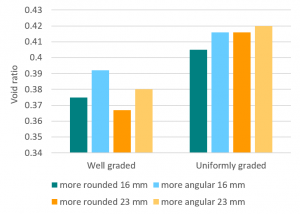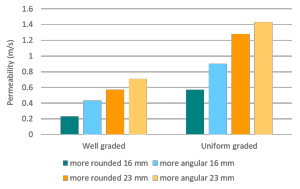Difference between revisions of "Aggregates"
Jump to navigation
Jump to search
Jenny Hill (talk | contribs) (Created page with " ==Reservoir Stone== thumb|Highest void ratio comes from having uniformly graded aggregate. File:Particle permeability.png|thumb|Higher perm...") |
Jenny Hill (talk | contribs) m |
||
| Line 1: | Line 1: | ||
==Reservoir Stone== | ==Reservoir Stone== | ||
| − | [[File:Particle void ratio.png|thumb| | + | [[File:Particle void ratio.png|thumb|The highest void ratio is found in uniformly graded aggregate, as there are no smaller particles to occupy the inter-particle pores.]] |
| − | [[File:Particle permeability.png|thumb|Higher permeability | + | [[File:Particle permeability.png|thumb|Higher permeability is found in larger, angular, uniformly graded aggregate. This is due to larger pore sizes and lower tortuosity.]] |
The important characteristics of the stone within the reservoir or [[underdrain]] are the lack of fines, the void ratio and (to a lesser extent) the permeability. | The important characteristics of the stone within the reservoir or [[underdrain]] are the lack of fines, the void ratio and (to a lesser extent) the permeability. | ||
Porosity and permeability are directly influenced by the size, gradation and angularity of the particles <ref>Judge, Aaron, "Measurement of the Hydraulic Conductivity of Gravels Using a Laboratory Permeameter and Silty Sands Using Field Testing with Observation Wells" (2013). Dissertations. 746. http://scholarworks.umass.edu/open_access_dissertations/746</ref> | Porosity and permeability are directly influenced by the size, gradation and angularity of the particles <ref>Judge, Aaron, "Measurement of the Hydraulic Conductivity of Gravels Using a Laboratory Permeameter and Silty Sands Using Field Testing with Observation Wells" (2013). Dissertations. 746. http://scholarworks.umass.edu/open_access_dissertations/746</ref> | ||
Revision as of 17:38, 23 January 2018
Reservoir Stone[edit]
The important characteristics of the stone within the reservoir or underdrain are the lack of fines, the void ratio and (to a lesser extent) the permeability. Porosity and permeability are directly influenced by the size, gradation and angularity of the particles [1]
- ↑ Judge, Aaron, "Measurement of the Hydraulic Conductivity of Gravels Using a Laboratory Permeameter and Silty Sands Using Field Testing with Observation Wells" (2013). Dissertations. 746. http://scholarworks.umass.edu/open_access_dissertations/746

